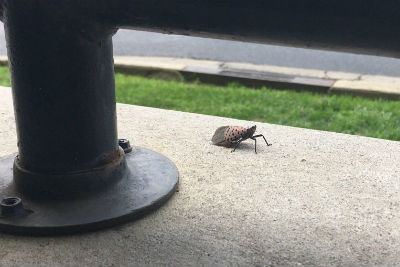
Virginia’s most infamous hitchhiker is on the move again: the spotted lanternfly.
These insects colonize quickly, disrupt native ecosystems, and potentially cause problems to agriculture and forest health. The spotted lanternfly is also a significant threat to Virginia’s grape and wine industries.
The College of Agriculture and Life Sciences at Virginia Tech and the Virginia Department of Agriculture and Consumer Services are partnering to empower the citizens of the Commonwealth to take action themselves on these most unwelcome visitors.
“We need to prevent spotted lanternfly from going somewhere else and becoming a bigger problem. Make sure it does not move on vehicles or plants and remove and squish any you find,” said Eric Day, manager of the Insect ID Lab in the Department of Entomology.
So, check that car wheel well, boat trailer, or box truck to make sure the unwanted hitchhikers haven’t found a free ride. Everyone can play a part by stomping the spotted lanternfly.
The Virginia Department of Agriculture and Consumer Services established a spotted lanternfly quarantine in 2019, and expanded it in 2021, to slow the spread of this pest to surrounding areas. The quarantined areas include Frederick, Warren, and Clarke counties, along with the city of Winchester, Virginia. The quarantine requires any vehicles moving goods across county lines to first be inspected for spotted lanternfly or their eggs to prevent this hitchhiker from spreading further.
In July 2022, the spotted lanternfly quarantine was greatly expanded to include the following cities and counties: Buena Vista, Charlottesville, Harrisonburg, Lexington, Lynchburg, Manassas, Manassas Park, Staunton, Waynesboro, Albemarle, Augusta, Carroll, Page, Prince William, Rockingham, Rockbridge, Shenandoah, and Wythe.
“I’ve been impressed with the citizens of Virginia in their efforts to reduce the impact of the spotted lanternfly,” Day said. “Active citizens and businesses in quarantine areas have helped slow spread significantly. Now, to stop this insect from becoming a bigger problem, we must take action to make sure this hitchhiking insect doesn’t get any free rides through our state.”
In addition to the actions that everyone can take, Virginia Cooperative Extension has an abundant library of digital and online publications and resources geared toward providing our communities with specialized information tailored to local environments and challenges, such as resources to help with the spotted lanternfly.










